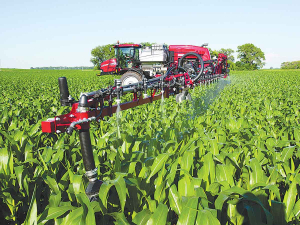Pesticides and Parkinson's
OPINION: Beneath the routine of spraying crops lies a growing concern that has remained largely under the radar: the link between pesticide and herbicide exposure and Parkinson’s disease.
 Studies from all around the world have shown that certain pesticides and herbicides—specifically paraquat, heptachlor, and rotenone—are associated with increased risk of Parkinson’s.
Studies from all around the world have shown that certain pesticides and herbicides—specifically paraquat, heptachlor, and rotenone—are associated with increased risk of Parkinson’s.
Beneath the routine of spraying crops lies a growing concern that has remained largely under the radar: the link between pesticide and herbicide exposure and Parkinson’s disease.
Parkinson’s disease is a progressive neurological disorder that, over time, robs sufferers of many of their faculties and quality of life. It is the second most common neurodegenerative disease after Alzheimer’s, but it is the world’s fastest growing. Disturbingly, rates of Parkinson’s are rising particularly quickly in rural farming communities.
Our increasingly ageing population is a factor, but this does not alone explain the rapid growth in incidence, especially given that fact that 20% of people living with Parkinson’s experience symptoms before age 50. Genes play a role too, with approximately 15% of individuals with Parkinson’s having a family history, but a lifetime of exposure to environmental factors, including herbicides and pesticides, industrial chemicals, and air pollution, is the key driver of disease. Indeed, a growing body of scientific evidence points to a strong connection between exposure to certain agricultural chemicals and the onset of Parkinson’s. This is supported by population-level studies (called ‘epidemiology’) showing a clear geographical relationship between the use of these chemicals and Parkinson’s incidence, as well as animal studies showing that exposure to these chemicals induces Parkinson’s like symptoms.
Studies from all around the world have shown that certain pesticides and herbicides—specifically paraquat, heptachlor, and rotenone—are associated with increased risk of Parkinson’s. Paraquat, for instance, has been found to increase the risk by as much as 200–600% depending on the level and duration of exposure, and it is now banned in many countries (it is restricted in NZ, and many paraquat- containing products have been banned, but not all).
What these chemicals, as well as air pollution and solvents like trichloroethylene (which is used in mining and dry cleaning) have in common is that they are thought to damage mitochondria—the energy-producing parts of cells. The exposure doesn’t have to be massive or dramatic; the disease is likely the result of chronic low-dose exposures over decades combined with genetic risk/predisposition and exposure to other potential triggers (such as infections and head knocks).
It’s heartbreaking that many people were never informed about the neurological risks of the products they regularly used. Labels might contain safety instructions, but they don’t always spell out the long-term consequences. And for many older-generation farmers, protective equipment was rarely used or even available.
Daniel McGowan is the chief executive of Cure Parkinson’s NZ.
Budou are being picked now in Bridge Pā, the most intense and exciting time of the year for the Greencollar team – and the harvest of the finest eating grapes is weeks earlier than expected.
The Real Estate Institute of New Zealand (REINZ) has released its latest rural property report, providing a detailed view of New Zealand’s rural real estate market for the 12 months ending December 2025.
Rural retailer Farmlands has released it's latest round of half-year results, labeling it as evidence that its five-year strategy is delivering on financial performance and better value for members.
OPINION: "We are back to where we were a year ago," according to a leading banking analyst in the UK, referring to US president Donald Trump's latest imposition of a global 10% tariff on all exports into the US.
DairyNZ says the Government’s proposed Resource Management Act reform needs further work to ensure it delivers on its intent.
Overseas Trade Minister Todd McClay says he's working constructively with the Labour Party in the hope they will endorse the free trade agreement (FTA) with India when the agreement comes before Parliament for ratification.
OPINION: Expect the Indian free trade deal to feature strongly in the election campaign.
OPINION: One of the world's largest ice cream makers, Nestlé, is going cold on the viability of making the dessert.